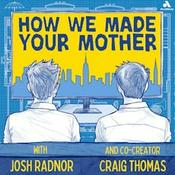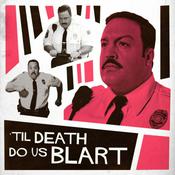56 afleveringen
- In Conclave (2024), Cardinal Thomas Lawrence (Ralph Fiennes) organizes a conclave to elect a new pope. Key candidates and factions vie with one another as the process plays out until finally a new pope is elected. The film was directed by Edward Berger from a script by Peter Straughan (based on the 2016 novel by Robert Harris), and features an all-star cast including Fiennes, John Lithgow, Stanley Tucci, and Isabella Rossellini. The film provides a window into the process for electing a new pope, along with the legal, historical, and political forces that have shaped it.
Timestamps:
0.00 Introduction
2:32 The origins of the conclave
5:29 Electing a new pope
8:03 The College of Cardinals
10:23 The Apostolic Constitutions
14:46 The contentious conclave in the film
21:05 Naming a new cardinal in pectore
24:51 Leo XIV, the new pope
26:58 The Roman Curia
26:38 The nuns in the film
30:05 Symbol and ritual: the smoke from the chimney
32:17 The custom of a new pope choosing a name
36:55 Struggles over different visions of the church
40:58 How accurate was the film in capturing a conclave?
42:39 How the conclave has changed
45:04 Possible future changes to the papal selection process
Further reading:
Allen, John L. Conclave: The Politics, Personalities, and Process of the Next Papal Election (2002)
Baumgartner, Frederic J., Behind Locked Doors: A History of the Papal Elections (2003)
Harris, Robert, Conclave (2016)
Povoledo, Elisabetta, “A Papal Primer That’s Fiction, but Also Rings True,” N.Y. Times (Mar. 2, 2025)
West, Morris, L., The Shoes of the Fisherman (1963)
Law on Film is created and produced by Jonathan Hafetz. Jonathan is a professor at Seton Hall Law School. He has written many books and articles about the law. He has litigated important cases to protect civil liberties and human rights while working at the ACLU and other organizations. Jonathan is a huge film buff and has been watching, studying, and talking about movies for as long as he can remember.
For more information about Jonathan, here's a link to his bio: https://law.shu.edu/profiles/hafetzjo.html
You can contact him at [email protected]
You can follow him on X (Twitter) @jonathanhafetz
You can follow the podcast on X (Twitter) @LawOnFilm
You can follow the podcast on Instagram @lawonfilmpodcast - Inglourious Basterds (2009), written and directed by Quentin Tarantino, revolves around two plots to assassinate Nazi leaders during the closing years of World War II. One plot centers on a secret band of Jewish-American soldiers under the command of Ltn. Aldo Raine (Brad Pitt)—the “Basterds”—who terrorize Nazis. The other involves Shosanna Dreyfus (Melanie Laurent), a young Jewish woman who narrowly escapes death at the hands of notorious “Jew hunter” Hans Landa (Christoph Waltz) and flees to Paris where she runs a cinema under a false identity. The plot lines converge at the Paris cinema where the Basterds and Shosanna are each separately plotting to kill Hitler and other Nazi leaders while they are attending the premiere of a German propaganda film. The film utilizes alternate history to explore themes surrounding the pursuit of justice against the perpetrators of mass atrocities and the complex relationship between law and vengeance.
Timestamps:
0:00 Introduction
2:37 Reimagining the arc of justice
8:00 Alternatives to the progress narrative
16:51 The power of violence and revenge
21:56 Counterfactuals and alternative histories
27:03 The limits of legalistic responses to atrocities
32:24 The role of cinema in Nazi Germany
39:00 Narratives of progress
44:10 Ending with a primal moment of revenge
Further reading:
Hussain, Nadine, “‘Inglorious Basterds’: A Satirical Criticism of WWII Cinema and the Myth of the American War Hero,” 13(2) Inquiries Journal 1 (2021)
Jackson, Robert H., Opening Statement before the International Military Tribunal, Robert H. Jackson Center (Nov. 21, 1945)
James, Caryn, “Why Inglourious Basterds is Quentin Tarantino’s Masterpiece,” BBC (Aug. 16, 2019)
Keydar, Renana, “‘Lessons in Humanity’: Re-evaluating International Criminal Law’s Narrative of Progress in the Post 9/11 Era,” 17 (2) J. Int’l Criminal Justice 229 (2019)
Kligerman, Eric. “Reels of Justice: Inglourious Basterds, The Sorrow and the Pity, and Jewish Revenge Fantasies,” in Quentin Tarantino's Inglourious Basterds: A Manipulation of Metacinema (Robert Dassanowsky ed., 2012)
Tekay, Baran “Transforming Cultural Memory: ‘Inglourious Basterds’”, 48(1) Film Criticism (2024)
Law on Film is created and produced by Jonathan Hafetz. Jonathan is a professor at Seton Hall Law School. He has written many books and articles about the law. He has litigated important cases to protect civil liberties and human rights while working at the ACLU and other organizations. Jonathan is a huge film buff and has been watching, studying, and talking about movies for as long as he can remember.
For more information about Jonathan, here's a link to his bio: https://law.shu.edu/profiles/hafetzjo.html
You can contact him at [email protected]
You can follow him on X (Twitter) @jonathanhafetz
You can follow the podcast on X (Twitter) @LawOnFilm
You can follow the podcast on Instagram @lawonfilmpodcast - I’m Still Here (dir. Walter Salles, 2024) is based on the true story of the enforced disappearance and murder of former congressman Rubens Paiva by the military dictatorship in Brazil. The film opens in Rio de Janeiro in 1970, where Rubens lives with his wife, Eunice, and their five children. Their lives are forever altered when the military government arrests and disappears Rubens. The film describes Eunice’s attempt to find out what happened to Rubens and to rebuild her life and raise her family in his absence. The film is based on the memoir of their son, Marcelo Rubens Paiva, who was a young boy when Rubens was disappeared. I’m Still Here provides a harrowing account of Brazil's military dictatorship and a moving story of a woman’s struggle to overcome adversity and obtain justice.
Timestamps:
0:00 Introduction
2:16 The military dictatorship in Brazil
4:38 Living amid contradictions
6:52 The kidnapping of the Swiss ambassador
8:33 Rubens’ arrest and disappearance
12:38 Authoritarian legality
14:18 The arrest and mistreatment of family members
17:16 Covering up state crimes
19:29 Exile as another tool of repression
23:08 Enforced disappearances
27:18 Leveraging international pressure
29:08 Eunice Paiva’s struggle and success
33:15 Support for the military dictatorship
36:01 Finally obtaining Rubens’ death certificate 25 years later
40:10 Brazil’s National Truth Commission
48:39 Authoritarian threats to democracy today
Further reading:
Atencio, Rebecca J., Memory’s Turn: Reckoning with Dictatorship in Brazil (2014)
Filho, Paulo Coehlo, “Truth Commission in Brazil: Individualizing Amnesty, Revealing the Truth,” The Yale Review of International Studies (Feb. 29, 2012)
Lima, Ana Gabriela Oliveira, “Corrected death certificates for Herzog, Rubens Paiva,and one hundred others are celebrated in a ceremony,” Folha de S. Paulo (Oct. 8, 2025)
Paiva, Marcelo Rubens, I’m Still Here (2025)
Pitts, Bryan, Until the Storm Passes: Politicians, Democracy, and the Demise of Brazil’s Military Dictatorship (2023)
Weinberg, Eyal, “Transitional Justice in Brazil, 1970s–2010s,” Oxford Research Encyclopedia (2022)
Law on Film is created and produced by Jonathan Hafetz. Jonathan is a professor at Seton Hall Law School. He has written many books and articles about the law. He has litigated important cases to protect civil liberties and human rights while working at the ACLU and other organizations. Jonathan is a huge film buff and has been watching, studying, and talking about movies for as long as he can remember.
For more information about Jonathan, here's a link to his bio: https://law.shu.edu/profiles/hafetzjo.html
You can contact him at [email protected]
You can follow him on X (Twitter) @jonathanhafetz
You can follow the podcast on X (Twitter) @LawOnFilm
You can follow the podcast on Instagram @lawonfilmpodcast - This episode explores An Officer and a Spy (J’accuse in French), Roman Polanski’s 2019 film about the Dreyfus Affair in France. The Dreyfus Affair is one of most significant events in late 19th/early 20th century, an event whose implications reverberated for decades in France and around the world. The Dreyfus Affair centered around the military trial of Captain Alfred Dreyfus on charges of treason. Wrongly convicted based on secret evidence and false information, Dreyfus’s case would become a cause célèbres and synonymous with a miscarriage of justice. It also exposed and exacerbated tensions within French society while underscoring deep and pervasive levels of antisemitism. Based on Robert Harris's 2013 novel of the same name, An Officer and a Spy focuses on the role of George Picquart, the military officer who helps uncover the truth behind Dreyfus’s wrongful conviction, and Picquart’s complex relationship with Dreyfus himself. Hewing closely to historical fact, the film highlights critical issues around law, truth, and justice, at the heart of the Dreyfus affair and why it remains so relevant today.
Timestamps:
0:00 Introduction
3:02 An overview of the Dreyfus case and key players
5:54. Georges Picquart
13:14. The struggle to overturn Dreyfus’s conviction
17:54 Tensions over the Dreyfus affair and a lack of accountability
20:48 The “evidence” in the Dreyfus case
25:38 How the Dreyfus affair divided French society
30:16 Other films about the Dreyfus affair
33:54 The controversy around Roman Polanski as director
39:21 Legacies of the Dreyfus affair
45:13 The role of Colonel Henry
Further reading:
Begley, Louis, Why the Dreyfus Affair Matters (2009)
Bredin, Jean‑Denis, The Affair: The Case of Alfred Dreyfus (1986)
Doherty, Thomas, “From Méliès to Polanski: The Dreyfus Affair on Film,” Cineaste (2020)
Harris, Robert, An Officer and a Spy (2013)
Read, Piers Paul, The Dreyfus Affair: The Scandal That Tore France in Two (2013)
Samuels, Maurice, Alfred Dreyfus: The Man at the Center of the Affair (2024)
Zola, Émile, The Dreyfus Affair: J’Accuse and Other Writings (1998)
Law on Film is created and produced by Jonathan Hafetz. Jonathan is a professor at Seton Hall Law School. He has written many books and articles about the law. He has litigated important cases to protect civil liberties and human rights while working at the ACLU and other organizations. Jonathan is a huge film buff and has been watching, studying, and talking about movies for as long as he can remember.
For more information about Jonathan, here's a link to his bio: https://law.shu.edu/profiles/hafetzjo.html
You can contact him at [email protected]
You can follow him on X (Twitter) @jonathanhafetz
You can follow the podcast on X (Twitter) @LawOnFilm
You can follow the podcast on Instagram @lawonfilmpodcast - This episode examines Juror #2, Clint Eastwood’s most recent—and perhaps final—film. Juror #2 centers around the trial of a man accused of murdering his girlfriend after a fight at a bar, leaving her in a ditch by the side of a road. The twist comes early: Justin Kemp a/k/a Juror #2 (played by Nicholas Hoult) soon realizes that the wrong man is on trial—as he hears the evidence, Kemp figures out that he, and not the defendant, killed the victim. Kemp realizes that he accidentally hit the defendant’s girlfriend with his car while she was walking along the side of a road on a dark and rainy night—thinking at the time, that he had hit a deer. Kemp, otherwise portrayed as a good man—a loving husband with a baby on the way—must navigate the moral dilemma as he serves on a jury that seems prepared to condemn an innocent man. Eastwood’s first courtroom drama in a long and legendary career, Juror #2 explores themes of justice, morality, and the imperfections of the legal system.
Timestamps:
0:00 Introduction
2:46 A flawed process
7:05 The ex-police detective on the jury and the motion for a mistrial
15:40 The lawyer’s problematic advice
23:16 A prosecutor who eventually does the right thing
27:17 The public defender
31:28 A good person caught in terrible circumstances?
40:40 Missing scenes in the legal narrative
44:46 A dark picture of the U.S. criminal justice system
Further reading:
“A Forensic Review of ‘Juror #2,’” J. American Academy of Psychiatry and the Law, vol. 53(1) (2025)
Banner, Adam, “Honesty in jury pool examined in ‘Juror #2,’” ABA Bar Journal (Jan. 28, 2025)
Brody, Richard, “In ‘Juror #2,’ Clint Eastwood Judges the System Harshly,” New Yorker (Oct 30, 2024)
Melonic, Emina, “The Storytelling of Clint Eastwood,” Law & Liberty (Jan. 10, 2025)
Upendra, Chidella, “The Ethical Vision of Clint Eastwood,” Journal of Religion & Film, vol. 17(2) (Oct. 2013)
Zagha, Muriel, “Clint Eastwood’s Puritan Morality Tale,” Engelsberg Ideas (Dec. 2, 2024)
Law on Film is created and produced by Jonathan Hafetz. Jonathan is a professor at Seton Hall Law School. He has written many books and articles about the law. He has litigated important cases to protect civil liberties and human rights while working at the ACLU and other organizations. Jonathan is a huge film buff and has been watching, studying, and talking about movies for as long as he can remember.
For more information about Jonathan, here's a link to his bio: https://law.shu.edu/profiles/hafetzjo.html
You can contact him at [email protected]
You can follow him on X (Twitter) @jonathanhafetz
You can follow the podcast on X (Twitter) @LawOnFilm
You can follow the podcast on Instagram @lawonfilmpodcast
Meer TV & film podcasts
Trending TV & film -podcasts
Over Law on Film
Law on Film explores the rich connections between law and film. Law is critical to many films, even to those that are not obviously about the legal world. Film, meanwhile, tells us a lot about the law, especially how it is perceived and portrayed. The podcast is created and hosted by Jonathan Hafetz, a lawyer, legal scholar, and film buff. Each episode, Jonathan and a guest expert will examine a film that is noteworthy from a legal perspective. What does the film get right about the law and what does it get wrong? Why is law important to understanding the film? And what does the film teach about law's relationship to the larger society and culture that surrounds it. Whether you're interested in law, film, or an entertaining discussion, there will be something here for you.
Podcast websiteLuister naar Law on Film, Reality Check - Winter Vol Liefde en vele andere podcasts van over de hele wereld met de radio.net-app

Ontvang de gratis radio.net app
- Zenders en podcasts om te bookmarken
- Streamen via Wi-Fi of Bluetooth
- Ondersteunt Carplay & Android Auto
- Veel andere app-functies
Ontvang de gratis radio.net app
- Zenders en podcasts om te bookmarken
- Streamen via Wi-Fi of Bluetooth
- Ondersteunt Carplay & Android Auto
- Veel andere app-functies


Law on Film
Scan de code,
download de app,
luisteren.
download de app,
luisteren.





































